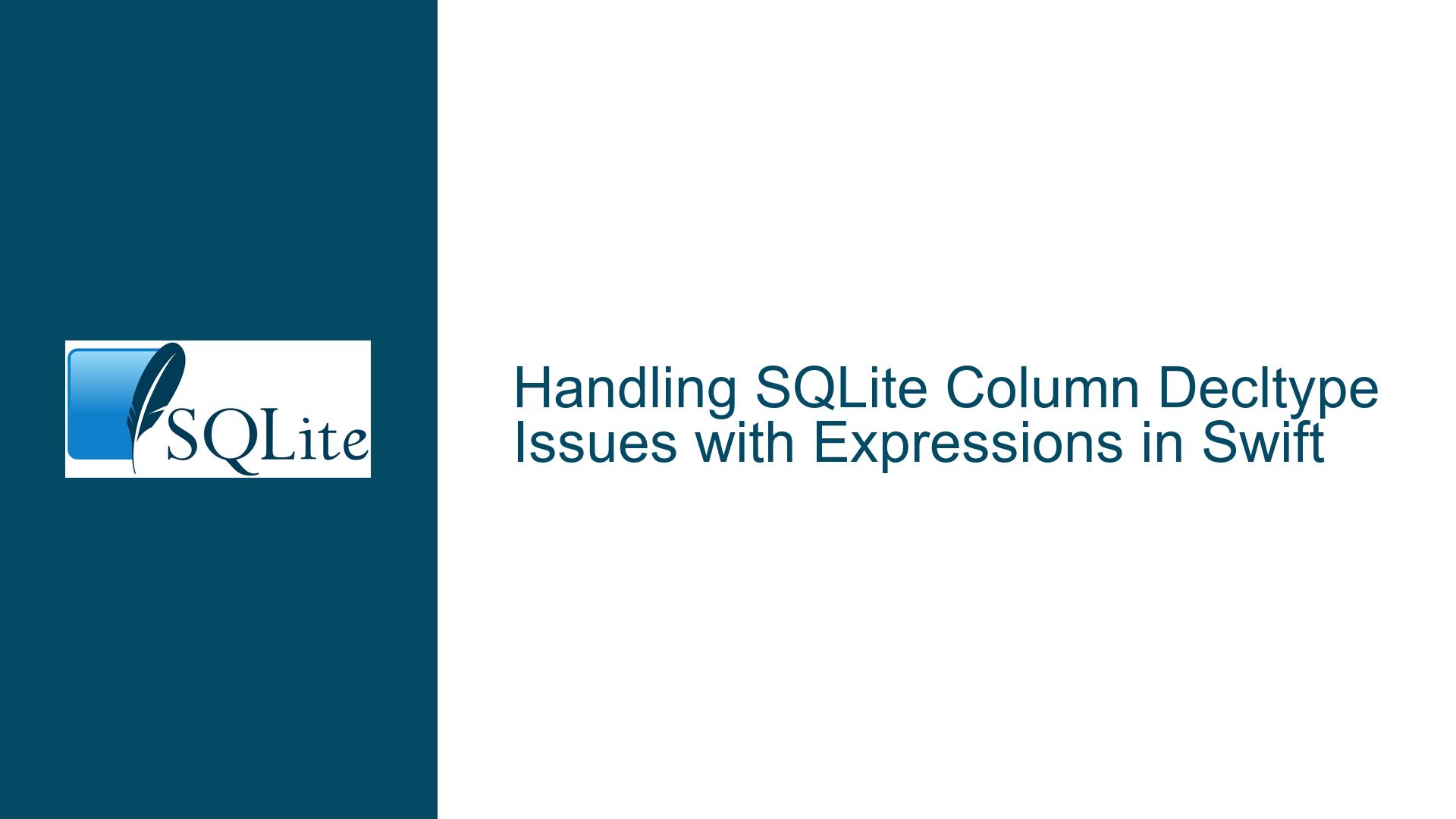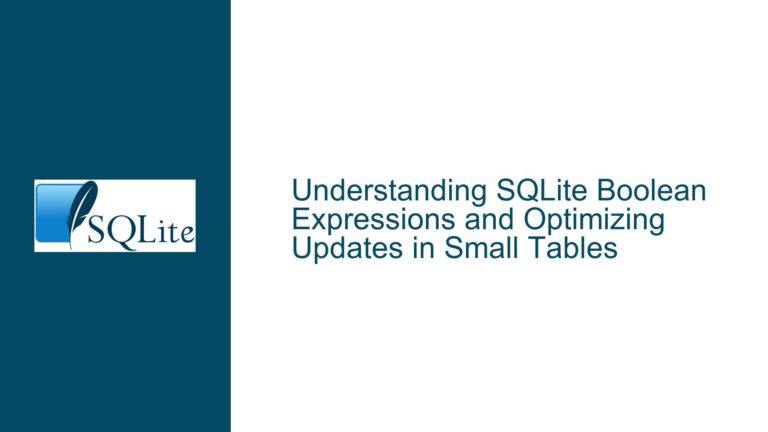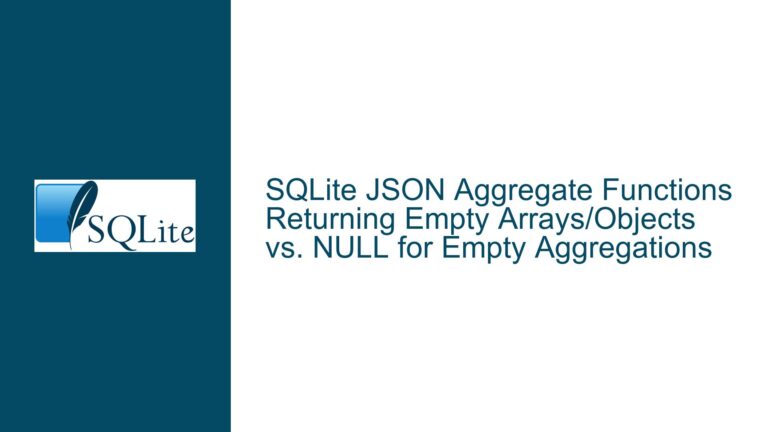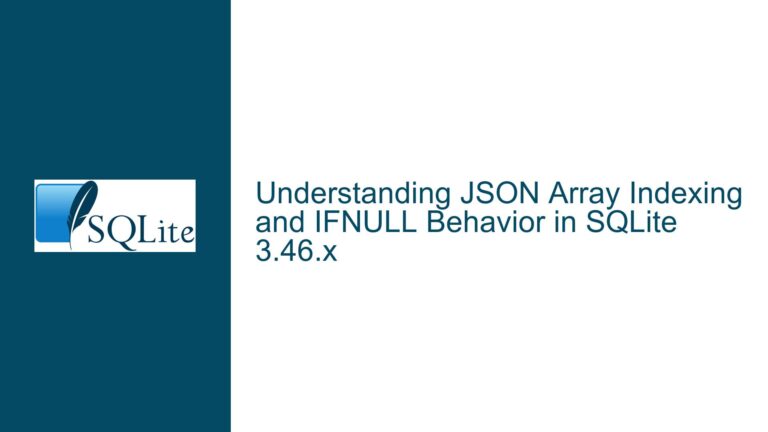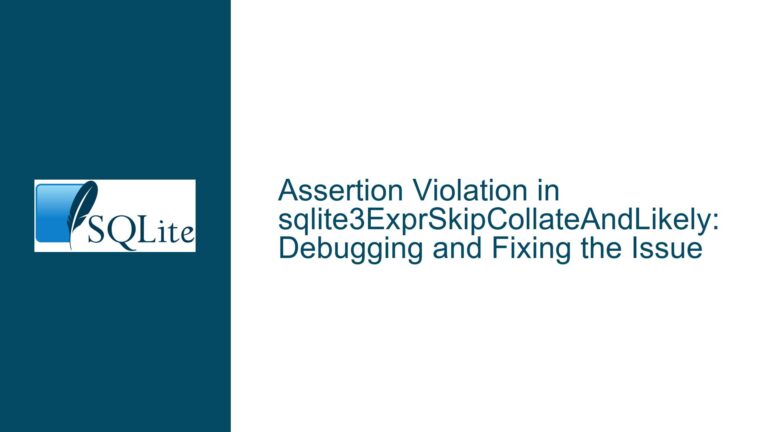Handling SQLite Column Decltype Issues with Expressions in Swift
SQLite Column Decltype Returns NULL for Expressions
When working with SQLite in Swift, particularly when using the sqlite3_column_decltype function, developers may encounter issues where the function returns NULL for certain types of SQL expressions. This behavior is particularly noticeable when dealing with functions like strftime() or other expressions that do not have a declared column type in the SQLite schema. The sqlite3_column_decltype function is designed to return the declared type of a column in the result set of a query. However, when the column is an expression or a subquery, the function returns NULL. This can lead to runtime errors in Swift, especially when the result is implicitly unwrapped and methods like uppercased() are called on what is essentially a nil value.
The core of the issue lies in the interaction between SQLite’s C API and Swift’s handling of optional values. In Swift, sqlite3_column_decltype is imported as a function that returns an implicitly unwrapped optional (UnsafePointer<Int8>!). When this function returns NULL (which is equivalent to nil in Swift), attempting to call methods like uppercased() on this nil value results in a runtime crash. This is a common pitfall when working with SQLite in Swift, particularly for developers who are not fully aware of how SQLite handles column types for expressions.
Implicitly Unwrapped Optionals and SQLite Expressions
The root cause of the issue is the combination of SQLite’s behavior with expressions and Swift’s handling of implicitly unwrapped optionals. In SQLite, when a column in the result set is an expression (such as strftime('%s')), the sqlite3_column_decltype function returns NULL because expressions do not have a declared type in the database schema. This is documented behavior in the SQLite C API, but it can be problematic when working with Swift, which treats NULL pointers as nil for optional types.
In Swift, sqlite3_column_decltype is imported as a function that returns an implicitly unwrapped optional (UnsafePointer<Int8>!). This means that the function is expected to return a non-nil value, but if it does return nil, Swift will still allow the code to compile. However, attempting to use this nil value (for example, by calling uppercased() on it) will result in a runtime crash. This is because implicitly unwrapped optionals are still optionals, and they must be checked for nil before use.
The issue is further compounded by the fact that the sqlite3_column_decltype function is often used in contexts where the developer assumes that the column type will always be available. For example, in the case of the strftime('%s') expression, the developer might expect that the result will have a declared type (such as TEXT or INTEGER), but in reality, SQLite treats this as an expression and returns NULL for the declared type. This mismatch between expectations and reality is what leads to the runtime error in Swift.
Safely Handling SQLite Expressions in Swift
To avoid runtime crashes when working with SQLite expressions in Swift, developers need to be aware of the behavior of sqlite3_column_decltype and take appropriate steps to handle NULL values. The first step is to recognize that sqlite3_column_decltype can return NULL for expressions, and to handle this case explicitly in the code. Instead of implicitly unwrapping the result of sqlite3_column_decltype, developers should check for nil before using the value.
One approach is to use optional binding to safely unwrap the result of sqlite3_column_decltype. For example, instead of directly calling uppercased() on the result, the developer can use an if let or guard let statement to check for nil and handle the case where the declared type is not available. This ensures that the code does not crash when sqlite3_column_decltype returns NULL.
Another approach is to avoid using sqlite3_column_decltype altogether for expressions that are known to return NULL. Instead, the developer can use other methods to determine the type of the result, such as inspecting the actual value returned by the query or using SQLite’s type affinity rules to infer the type. For example, if the result of strftime('%s') is known to be an integer, the developer can directly cast the result to an Int without relying on sqlite3_column_decltype.
In addition to these techniques, developers should also consider using SQLite’s PRAGMA statements to enable stricter type checking or to customize the behavior of the database. For example, the PRAGMA strict command can be used to enforce stricter type checking in SQLite, which can help catch issues with expressions and column types at compile time rather than at runtime.
Finally, developers should be aware of the limitations of SQLite’s type system and how it interacts with Swift’s type system. SQLite is a dynamically typed database, which means that it does not enforce strict type checking at the schema level. This can lead to unexpected behavior when working with expressions and column types, particularly in a statically typed language like Swift. By understanding these limitations and taking appropriate steps to handle NULL values and expressions, developers can avoid runtime crashes and ensure that their code works correctly with SQLite.
Conclusion
The issue of sqlite3_column_decltype returning NULL for expressions in SQLite is a common pitfall when working with SQLite in Swift. The root cause of the issue is the combination of SQLite’s behavior with expressions and Swift’s handling of implicitly unwrapped optionals. To avoid runtime crashes, developers need to be aware of this behavior and take appropriate steps to handle NULL values in their code. By using optional binding, avoiding sqlite3_column_decltype for expressions, and understanding the limitations of SQLite’s type system, developers can ensure that their code works correctly and avoids runtime errors.
